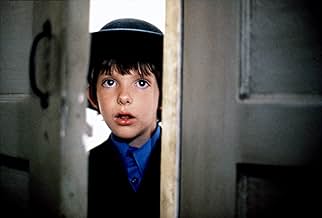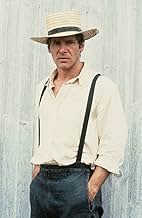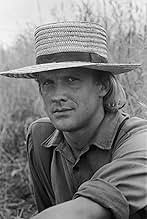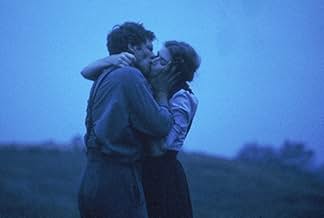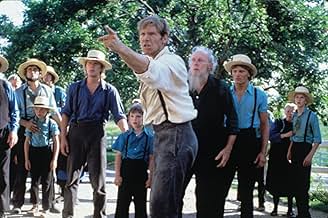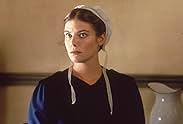Witness
- 1985
- Tous publics
- 1h 52m
While protecting an Amish boy - who is the sole witness to a brutal murder - and his mother, a detective is forced to seek refuge within their community when his own life is threatened.While protecting an Amish boy - who is the sole witness to a brutal murder - and his mother, a detective is forced to seek refuge within their community when his own life is threatened.While protecting an Amish boy - who is the sole witness to a brutal murder - and his mother, a detective is forced to seek refuge within their community when his own life is threatened.
- Won 2 Oscars
- 13 wins & 28 nominations total
Summary
Reviewers say 'Witness' is acclaimed for its crime thriller elements and cultural exploration, highlighting Harrison Ford's nuanced performance. The Amish community portrayal, though sometimes romanticized, adds depth. The romantic subplot is noted for its subtlety. Peter Weir's direction and cinematography are praised, yet some criticize plot inconsistencies and pacing. The soundtrack, though fitting, occasionally clashes with the film's tone.
Featured reviews
'Witness' is about a guy who is a total product of the big city - he's a tough cop, he relies on cars, phones, and guns - who hides at an Amish farm to prevent a boy (the witness) and himself from being found by the killers.
The film is less about Harrison Ford learning to live among the Amish as it is the Amish learning to live with Ford. He is a man who at first glance has no matching ideals. The film is fantastic on that level, especially thanks to Peter Weir's direction, who brilliantly shows Ford gradually becoming accepted by the Amish men.
There is very little dialogue among the characters, and Rachel (McGillis) talks even less, not because she doesn't have anything to say, but because Amish rules of life don't seem to allow her to. They are presented as a quiet people, so McGillis has the difficult task of making Rachel speak without dialogue, and she does it well, which carries over to Ford (he got an Oscar nomination, she didn't).
It's only at the climax of the film, when the action takes over that the film begins to weaken. The filmmakers seem to have some kind of answer to how the killer's storyline should be resolved, but it's not very good.
Despite the flaw, the film is excellent based on the performances of the cast, the editor who had to put all the dialogue-less scenes together (and later, won the Oscar for it), and Weir's masterful handling of the story.
The film is less about Harrison Ford learning to live among the Amish as it is the Amish learning to live with Ford. He is a man who at first glance has no matching ideals. The film is fantastic on that level, especially thanks to Peter Weir's direction, who brilliantly shows Ford gradually becoming accepted by the Amish men.
There is very little dialogue among the characters, and Rachel (McGillis) talks even less, not because she doesn't have anything to say, but because Amish rules of life don't seem to allow her to. They are presented as a quiet people, so McGillis has the difficult task of making Rachel speak without dialogue, and she does it well, which carries over to Ford (he got an Oscar nomination, she didn't).
It's only at the climax of the film, when the action takes over that the film begins to weaken. The filmmakers seem to have some kind of answer to how the killer's storyline should be resolved, but it's not very good.
Despite the flaw, the film is excellent based on the performances of the cast, the editor who had to put all the dialogue-less scenes together (and later, won the Oscar for it), and Weir's masterful handling of the story.
It is a film about adults, whose lives have dignity and whose choices matter to them. The story focuses on a detective (Harrison Ford) protecting a young Amish boy who becomes the target of a ruthless killer after he witnesses a brutal murder. Witness is as much about the meeting of cultures as about cops and robbers, this is one of those lucky movies which works out well on all counts and shows that there are still craftsmen lurking in Hollywood. The film is powerful, assured, full of beautiful imagery and devoid of easy moralising, which is good. Ford is Chicago Detective John Book, assigned to investigate a murder that was committed by crooked cop Danny Glover. The only witness is the son of an Amish widow, played by Kelly McGillis. When Book gets too close to the truth, the crooked cops try to kill him, forcing Book to take it on the lamb and hide out in the Amish country. There, he slowly makes a transition into their society, their way of life, and of course, he starts to fall for Kelly McGillis. (who would later star with pretty boy Cruise in "Top Gun"). Alexander Godunov, who later played the murderous Karl in "Die Hard", makes his debut here as an Amish farmer who is, Ford's romantic rival for Kelly. Also making his debut here is a much younger Viggo Mortensen as another Amish father. Mortensen's barely evident in the role out here,although had his eventual success as Aragorn in "Lord of the Rings" ........ After Star Wars & Indiana Jones,Ford succeeded in a serious role and his multi-layered performance earned him his only Oscar Nomination till date.Well directed Romantic Thriller by Peter Weir (Director of Dead poet's Society and Truman Show) that earned him his first Academy Award Nomination. Do watch this one for great Cinematography and Artwork
My Rating - 8/10
My Rating - 8/10
This is one of those movies whose virtues and subtleties become more and more apparent with subsequent viewings. The crime story is nothing more than a pretense - a "MacGuffin", in Hitchcock's phrase - on which to hang this sensitive and insightful story of the conflict between modernity and the culture of the Amish, which is portrayed here with admiring respect and not a hint of condescension.
Harrison Ford's portrayal of John Book is perhaps his finest work on screen so far. In particular, Book's struggle to suppress his rising attraction for Rachel, and his tormented realization that a relationship between them is not possible, is achingly portrayed. Ford's effort is well-matched by Kelly McGillis, whose beauty here is almost breathtaking. The erotic interplay between them, because it is unconsummated, radiates an almost painful tension, and the easily lampooned "running through the field" scene - because it has been led up to so convincingly - is almost heartbreaking. The character of Eli Lapp, wonderfully played by Jan Rubes, is richly multifaceted. His suspicion of the "English" outsider and his anger at Rachel's attraction to him, is surmounted by an underlying humanity. His parting words to Book, "You be careful out there among them English," are moving testimony to his acceptance of him. His stern yet loving dialogue to his grandson about renouncing hatred and violence is a treasured moment.
Both direction and cinematography are splendid. The simplicity of Amish interiors is shot in a way that makes its austerity almost beautiful, and the barnraising scene is an exercise in cinematic lyricism.
It would be easy to fault the movie for the facile scene in which the punks taunting of Book's newfound friends and protectors drives him over the edge (Eli: "It's not our way, Book" / Book: "No, but it's MY way."), but his gift to the young thug of a bloody nose is mighty satisfying to behold.
My one criticism is with the music; certainly not with the venerable Maurice Jarre's score itself, but with its paltry synthesized realization. They should have found the money to spring for a full orchestra.
In short, a highly satisfying, richly themed, and multifaceted film which is well worth watching.
Harrison Ford's portrayal of John Book is perhaps his finest work on screen so far. In particular, Book's struggle to suppress his rising attraction for Rachel, and his tormented realization that a relationship between them is not possible, is achingly portrayed. Ford's effort is well-matched by Kelly McGillis, whose beauty here is almost breathtaking. The erotic interplay between them, because it is unconsummated, radiates an almost painful tension, and the easily lampooned "running through the field" scene - because it has been led up to so convincingly - is almost heartbreaking. The character of Eli Lapp, wonderfully played by Jan Rubes, is richly multifaceted. His suspicion of the "English" outsider and his anger at Rachel's attraction to him, is surmounted by an underlying humanity. His parting words to Book, "You be careful out there among them English," are moving testimony to his acceptance of him. His stern yet loving dialogue to his grandson about renouncing hatred and violence is a treasured moment.
Both direction and cinematography are splendid. The simplicity of Amish interiors is shot in a way that makes its austerity almost beautiful, and the barnraising scene is an exercise in cinematic lyricism.
It would be easy to fault the movie for the facile scene in which the punks taunting of Book's newfound friends and protectors drives him over the edge (Eli: "It's not our way, Book" / Book: "No, but it's MY way."), but his gift to the young thug of a bloody nose is mighty satisfying to behold.
My one criticism is with the music; certainly not with the venerable Maurice Jarre's score itself, but with its paltry synthesized realization. They should have found the money to spring for a full orchestra.
In short, a highly satisfying, richly themed, and multifaceted film which is well worth watching.
Won Oscars for Best Writing, Screenplay Written Directly for the Screen, and Best Editing. Nominated for five more Oscars including Best Picture, Best Actor, Harrison Ford, and Best Director Peter Weir. Weir Directed the 'The Year of Living Dangerously', and 'The Truman Show'. After seeing it maybe 10 times, I find it is one of those infrequent stories that still draws my attention. This places it in the company of pictures like 'The Godfather', and some others which stand the test of repeat viewings over time. Kelly McGillis is the film's intelligent and talented secret weapon. Her performance makes me wonder where she is these days. She is an Amish widow from a rural Amish community. On a trip to the city her little boy witnesses a murder in the restroom of a train station. Police investigator Harrison Ford finds himself targeted along with the boy by corrupt cops in his unit that did the murder. He is hurt in a shootout and hides with the Amish. He wears Amish clothes, and labors with the men of the community as he rebuilds his strength. An attraction naturally develops between the McGillis and Ford charactors. The chemistry is remarkably intelligent, and authentically portrayed. Their worlds are seperated by a cultural gulf. They are drawn by each other, and respect one another. The contrasts are drawn clearly between the quaint honesty and almost dreamlike serenity of the Amish, and the horrible violence intruding upon them from the outside world. The resolution of the story should not be given away to someone who has not seen the movie. This film is a different kind of thriller in more ways than one. It's makers kept it intelligent, instead of resorting to another pyrotechnic joyride. -Robert Hartman-
An earlier comment on the site suggests that the film is flawed because the Amish boy, coming from a secure, peaceful environment, would not be able to witness a scene of brutality without becoming utterly traumatised.
Far from being a flaw, I believe this is a key statement of the theme of the film - that the close, peaceful and loving upbringing he has enjoyed provide the boy with an emotional strength and resilience that allows him to recognise evil and reject it. Later that same environment will provide the embittered and emotionally scarred with a temporary oasis where he can in part recover from the loveless violence of his own life.
Contrast the failure of community in the vast and soulless terminal building, where the first scene is set, where every one is isolated by the indifference and aggression of their fellow travellers, with the co-operative endeavour of the justly famous barn raising scene, where even the outsider is welcomed and included in an act of joint creation.
Far from being a flaw, I believe this is a key statement of the theme of the film - that the close, peaceful and loving upbringing he has enjoyed provide the boy with an emotional strength and resilience that allows him to recognise evil and reject it. Later that same environment will provide the embittered and emotionally scarred with a temporary oasis where he can in part recover from the loveless violence of his own life.
Contrast the failure of community in the vast and soulless terminal building, where the first scene is set, where every one is isolated by the indifference and aggression of their fellow travellers, with the co-operative endeavour of the justly famous barn raising scene, where even the outsider is welcomed and included in an act of joint creation.
The Life and Times of Harrison Ford
The Life and Times of Harrison Ford
Take a look back at Harrison Ford's movie career in photos.
Did you know
- TriviaIn preparation for her role, Kelly McGillis lived with an actual Amish widow and her seven children for a while before filming began to get the speech cadence down and to observe the daily life of an Amish widowed mother.
- GoofsJohn Book's Volkswagen hit the birdhouse and broke its windshield. Later the car is seen in the barn with an unbroken windshield.
The windshield is cracked and damaged, but still reasonably intact when Book attempts to start the car. When Book hit the birdhouse and it fell on the windshield, it looked to be far more severely damaged.
- Crazy creditsThe closing shot of John Book driving away in his car passing Daniel provides an initial backdrop for the end credits.
- Alternate versionsIn the original theatrical stereo mix, just after John Book is shot, we see a close-up of his gun and a voice-over from an earlier conversation Book had with the captain. We hear the words: "Who else knows about this? "Just you and me." In the DVD version, which contains a remixed 5.1 track, we see the close-up of the gun and then it segues to Book's sister waking up Rachel and her son Samuel, but the voice-over is missing. In addition to that, there are also new sound effects like ambient noise and especially gunshots added throughout. However Arrow's 2023 4K release restores the theatrical mix which contains the original sound effects and the missing parking garage dialogue.
- Soundtracks(What a) Wonderful World
(1959)
Written by Sam Cooke, Herb Alpert and Lou Adler
Performed by Greg Chapman
Courtesy of Abkco Music, Inc.
Details
- Release date
- Country of origin
- Languages
- Also known as
- Testigo en peligro
- Filming locations
- Production companies
- See more company credits at IMDbPro
Box office
- Budget
- $12,000,000 (estimated)
- Gross US & Canada
- $68,706,993
- Opening weekend US & Canada
- $4,539,990
- Feb 10, 1985
- Gross worldwide
- $68,707,459
- Runtime
- 1h 52m(112 min)
- Color
- Sound mix
- Aspect ratio
- 1.85 : 1
Contribute to this page
Suggest an edit or add missing content




